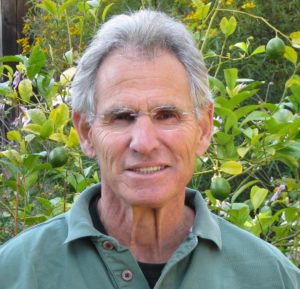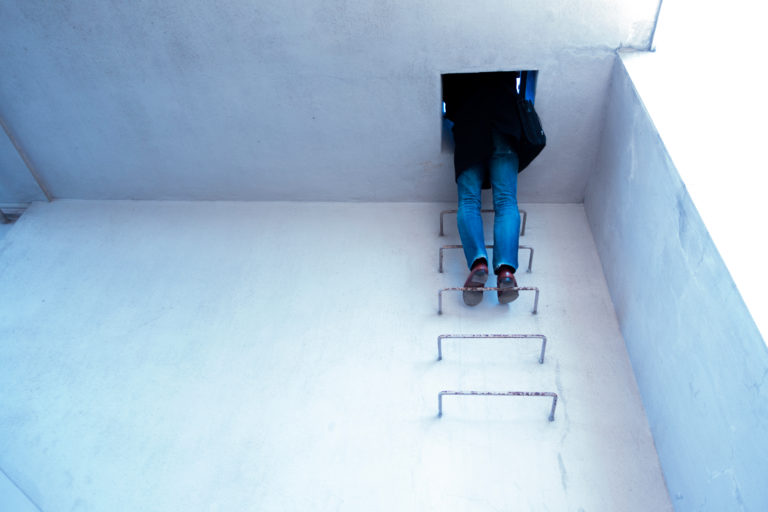Jon Kabat-Zinn
Present to Life, Moment by Moment
“The more we can learn these lessons, the more we will not be running towards our death, but opening to our lives.” Mindfulness researcher Jon Kabat-Zinn on the physiological and spiritual potential of being present to every moment of daily life.
Guest

Jon Kabat-Zinn is founding director of the Stress Reduction Clinic and the Center for Mindfulness in Medicine, Health Care and Society at the University of Massachusetts Medical School. His books include Coming To Our Senses: Healing Ourselves and the World Through Mindfulness.
Transcript
KRISTA TIPPETT, HOST: We are matter, kindred with ocean and tree and sky. We are flesh and blood and bone. Mind and spirit are as physical as they are mental. The line we’d drawn between them was whimsy, born of the limits of our understanding.
Emotions and memories, from despair to gladness, root in our bodies. Our brains lay physical pathways and lay bodily direction. Our bodies are longing and joy and fear and a lifelong desire to be safe and loved, incarnate.
Medicine became an art of treating our parts, not our whole. Religion divided us inside with high mystical notions that we are souls trapped in bodies, and theologies that made flesh and sin indistinguishable. Now, we’re bringing our sense of ourselves back to earth. Physical, emotional, and spiritual are more entangled than we guessed, more interactive in every direction, and this knowledge is a form of power.
Jon Kabat-Zinn was introduced to meditation while he was studying molecular biology at MIT. He says that scientists make the best meditators because they are most comfortable with knowing what they don’t know. For him, it felt like a way to tap into different ways of knowing, to reconcile energies that had coexisted uneasily in his childhood with a scientist father and painter mother. He came to feel that what he was learning should be accessible to everyone and that it held relevance to illness, healing, and stress. In the 1980s, he created something called Mindfulness Based Stress Reduction. He’s contributed to a transformation of Western medicine that is still unfolding:
MR. JON KABAT-ZINN: What these technologies or intra-psychic technologies — whatever you want to call them — offer us, is a chance to continually return to what’s deepest and best in ourselves. It’s not something you have to get by going to Harvard or working in the vineyards for 20 years; you’ve already got it. And the body is a big part of it. So the practice of mindfulness, whether you’re doing it in some formal way, meditating in a sitting position or lying down doing a body scan or doing mindful hatha yoga — the real practice is living your life as if it really mattered from moment to moment. The real practice is life itself. It is coming to all those senses in hearing, seeing, smelling, tasting, touching, and also, we could say, minding.
MS. TIPPETT :You really put a fine point on what’s at stake — that any moment in which we’re not aware, any moment in which we’re not aware, any moment in which we’re not attentive, is lost. You quote Thoreau in Walden, “Only that day dawns to which we are awake.”
MR. KABAT-ZINN : Only that day dawns to which we are awake. It’s the third-to-last line in the book of Walden. This is a realization that he had in the 1840s in Concord, which we might think of as idyllic. He was describing the residents of Concord, and the farmers, as living lives of quiet desperation. So it’s not just e-mail and the Internet carrying us away from ourselves.
MS. TIPPETT :It’s the human condition.
MR. KABAT-ZINN :It’s the human condition. We call ourselves homo sapiens sapiens. That’s the species name we’ve given ourselves. And that comes from the Latin sapere, which means “to taste” or “to know.” The species that knows and knows that it knows. And now maybe we need to live ourselves into owning that name by cultivating awareness and awareness of awareness itself and let that be in some sense the guide as to what we’re going to invest in, how we’re going to make decisions about where we live, where we’re going to send our kids to school, how we’re going to be at the dinner table. Whether we’re going to take our bodies and our children and our parents for granted, or whether we’re going to live life as if it really mattered moment by moment.
The more we can sort of learn these lessons, the more we will not be in some sense running towards our death, but opening to our lives. There’s a huge distinction between the two. And all the scientific evidence is suggesting that when you choose life in the way I’m talking about, your brain changes in both form and function, your immune system changes, your body changes. I mean, we start to really take care of what’s most important. And there are very, very tangible results at the level of the body, the mind, and the heart, and most importantly our relationships with the world and with our loved ones and with our own bodies.





